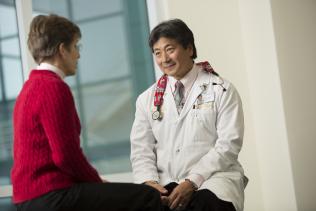As a patient in the Heart Failure, Cardiomyopathy, and Pulmonary Hypertension Program, you will experience expert evaluation, disease management, treatment, and referral for interrelated conditions.
The comprehensive care you will receive is delivered by our specialized care teams. Team members are skilled and experienced in meeting your individual medical and support needs. Our teams work with you to help you understand your condition and what you need to do, and provide access to the treatment options, follow up and supportive care you need.
Our services are integrated across inpatient and outpatient settings, as well as through referral and follow up for advanced testing and procedures. Care is provided through three specialized clinics:
- Advanced Heart Failure and Cardiomyopathy Program
- Pulmonary Hypertension Clinic
- Cardio-Oncology Clinic
Our services include:
- In-depth evaluation, including thorough review of medical history and prior testing, and referral for additional diagnostic testing
- Referral to advanced diagnostic and treatment modalities, including cardiac imaging, catheterization and electrophysiology
- Review and management of medications
- Care management and support including referral to other specialties to manage symptoms and related conditions
Advanced Heart Failure and Cardiomyopathy Program
Cardiomyopathy includes different illnesses of the heart muscle that affect its ability to pump normally. In some cases, cardiomyopathy is inherited, and in other cases it is caused by conditions such as hypertension, valve disease, congenital heart disease, or coronary artery disease, or by certain medications and substances.
Some cardiomyopathies have no symptoms and require no treatment. Others can have severe symptoms and complications. Effective treatment can control symptoms, reduce complications, and keep the disease from getting worse.
Cardiomyopathy is a major cause of heart failure, which develops gradually as the heart muscles get weaker. Heart failure does not mean that the heart has stopped, but rather that it is weakened and not pumping and relaxing as well as it should. Heart failure can present as acute (sudden) or chronic (slowly progressive), and can be associated with a variety of heart conditions.
Heart failure can progress to a state of congestion, also known as congestive heart failure, in which fluid builds up around the heart, lungs, and other parts of the body.
Treatments include lifestyle changes, medicines, surgery, implanted devices to correct arrhythmias, and other nonsurgical procedures.
Learn more about our Advanced Heart Failure and Cardiomyopathy Program
Pulmonary Hypertension Clinic
In pulmonary hypertension, the blood vessels that supply the lungs become thick or clogged. The vessels can't carry as much blood, so blood backs up and the pressure in the pulmonary artery increases, causing the heart to work harder. If high pressure continues untreated, the heart becomes enlarged, weaker and less able to pump blood into the lungs and eventually, throughout the body.
Pulmonary hypertension is most often the result of left heart disease (LHD) which accounts for 65-80% of cases, or chronic obstructive pulmonary disease (COPD). Other associated conditions include collagen vascular disease, scleroderma, rheumatoid arthritis, liver disease, kidney disease and pulmonary embolism.
Treatments include lifestyle changes, medical management and, in very rare cases, lung transplantation surgery.
Learn more about our Pulmonary Hypertension Clinic
Cardio-Oncology Clinic
If you are planning to or have received chemotherapy, radiation, or immunotherapy for specific cancers, you might be susceptible to alterations in cardiac function. The emerging field of cardio-oncology concentrates on specific heart conditions that might occur in such situations. Our team is specifically trained to take care of patients with cardiac issues related to a cancer or specific treatment.
